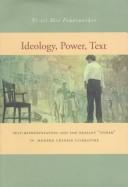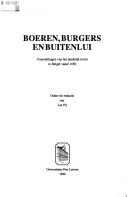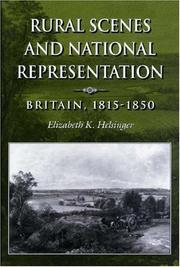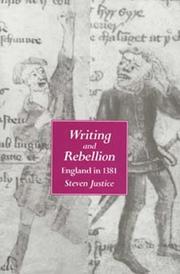| Listing 1 - 5 of 5 |
Sort by
|
Book
ISBN: 1283858150 3110285428 3110285436 9783110285420 9781283858151 9783110285369 3110285363 9783110285437 Year: 2012 Publisher: Berlin ; Boston : De Gruyter,
Abstract | Keywords | Export | Availability | Bookmark
 Loading...
Loading...Choose an application
- Reference Manager
- EndNote
- RefWorks (Direct export to RefWorks)
Older research on the premodern world limited its focus on the Church, the court, and, more recently, on urban space. The present volume invites readers to consider the meaning of rural space, both in light of ecocritical readings and social-historical approaches. While previous scholars examined the figure of the peasant in the premodern world, the current volume combines a large number of specialized studies that investigate how the natural environment and the appearance of members of the rural population interacted with the world of the court and of the city. The experience in rural space was important already for writers and artists in the premodern era, as the large variety of scholarly approaches indicates. The present volume signals how much the surprisingly close interaction between members of the aristocratic and of the peasant class determined many literary and art-historical works. In a surprisingly large number of cases we can even discover elements of utopia hidden in rural space. We also observe how much the rural world was a significant element already in early-medieval mentality. Moreover, as many authors point out, the impact of natural forces on premodern society was tremendous, if not catastrophic.
Literature, Medieval --- Peasants in literature. --- Rural conditions in literature. --- European literature --- Ecocriticism. --- Ecological literary criticism --- Environmental literary criticism --- Criticism --- Peasantry in literature --- History and criticism. --- Early Modern Age. --- Medieval Culture. --- Middle Ages. --- Rural Space.

ISBN: 0804765197 9780804765190 0804733198 9780804733199 Year: 2020 Publisher: Stanford, CA : Stanford University Press,
Abstract | Keywords | Export | Availability | Bookmark
 Loading...
Loading...Choose an application
- Reference Manager
- EndNote
- RefWorks (Direct export to RefWorks)
The division between the scholar-gentry class and the “people” was an enduring theme of the traditional Chinese agrarian-bureaucratic state. Twentieth-century elites recast this as a division between intellectuals and peasants and made the confrontation between the writing/intellectual self and the peasant “other” a central concern of literature. The author argues that, in the process, they created the “peasantry,” the downtrodden rural masses represented as proper objects of political action and shifting ideological agendas. Throughout this transition, language or discourse has been not only a weapon of struggle but the center of controversy and contention. Because of this primacy of language, the author’s main approach is the close reading or, rather, re-reading of significant narrative fictions from four literary generations to demonstrate how historical, ideological, and cultural issues are absorbed, articulated, and debated within the text. Three chapters each focus on one representative author. The fiction of Lu Xun (1881-1936), which initiated the literary preoccupation with the victimized peasant, is also about the identity crisis of the intellectual. Zhao Shuli (1906-1970), upheld by the Communist Party as a model “peasant writer,” tragically exemplifies in his career the inherent contradictions of such an assigned role. In the post-Mao era, Gao Xiaosheng (1928—) uses the ironic play of language to present a more ambiguous peasant while deflating intellectual pretensions. The chapter on the last of the four “generations” examines several texts by Mo Yan (1956—), Han Shaogong (1952—), and Wang Anyi (1954—) as examples of “root-searching” fiction from the mid-1980’s. While reaching back into the past, this fiction is paradoxically also experimental in technique: the encounter with the peasant leads to questions about the self-construction of the intellectual and the nature of narrative representation itself. Throughout, the focus is on texts in which some sort of representation or stand-in of the writer/intellectual self is present—as character, as witness, as center of consciousness, or as first-person or obtrusive narrator. Each story catches the writer in a self-reflective mode, the confrontation with the peasant “other” providing a theater for acting out varying dramas of identity, power, ideology, political engagement, and self-representation.
Chinese fiction --- Peasants in literature. --- Peasantry in literature --- History and criticism. --- Peasants in literature --- S02/0220 --- S06/0261 --- S06/0262 --- S15/0210 --- S16/0170 --- S16/0180 --- History and criticism --- China: General works--Intellectuals: after 1949 --- China: Politics and government--Class conflict --- China: Politics and government--Mass line, mass criticism --- China: Language--Special linguistic subjects --- China: Literature and theatrical art--General works on modern literature --- China: Literature and theatrical art--Stylistics

ISBN: 9061864054 9789061864059 Year: 1990 Volume: 8 Publisher: Leuven Universitaire pers Leuven
Abstract | Keywords | Export | Availability | Bookmark
 Loading...
Loading...Choose an application
- Reference Manager
- EndNote
- RefWorks (Direct export to RefWorks)
Iconography --- anno 1800-1999 --- Belgium --- Belgique --- België --- Boeren in de kunst --- Boeren in de literatuur --- Geschiedenis van de nieuwste tijden --- Histoire contemporaine --- Paysans dans l'art --- Paysans dans la litterature --- Peasants in art --- Peasants in literature --- Vlaanderen --- Arts, Flemish --- Peasants in art. --- Country life in art. --- 63 <09> --- Academic collection --- Z316.324.2 --- Z316.343.64 --- Z++93/08 --- 316.343.64 --- 63-057 --- Country life in art --- -Arts, Flemish --- -Flemish arts --- Peasantry in art --- History of agriculture --- 63 <09> History of agriculture --- -History of agriculture --- België. --- Vlaanderen. --- -Peasantry in art --- Flemish arts --- Peasantry --- 920 --- landelijke geschiedenis --- geschiedenis België --- histoire Belgique --- Arts, Flemish - 19th century. --- Arts, Flemish - 20th century.

ISBN: 0691021465 1322010501 0691608504 0691636958 1400864372 9781400864379 9780691021461 9780691608501 Year: 1997 Volume: *4 Publisher: Princeton, New Jersey
Abstract | Keywords | Export | Availability | Bookmark
 Loading...
Loading...Choose an application
- Reference Manager
- EndNote
- RefWorks (Direct export to RefWorks)
Elizabeth Helsinger's iconoclastic book explores the peculiar power of rural England to stand for conflicting ideas of Britain. Despite the nostalgic appeal of Constable's or Tennyson's rural scenes, they record the severe social and economic disturbances of the turbulent years after Waterloo. Artists and writers like Cobbett, Clare, Turner, Emily Brontë, and George Eliot competed to claim the English countryside as ideological ground. No image of rural life produced consensus over the great questions: who should constitute the nation, and how should they be represented? Helsinger ponders how some images of rural life and land come to serve as national metaphors while others challenge their constructions of Englishness at the heart of the British Empire.Drawing on recent work in social history, nationalism, and geography, as well as the visual and literary arts, Helsinger recovers other possible and alternative readings of social ties embedded in the imagery of land. She reflects on the power of rural images to transfer local loyalties to the national scene, first popularizing then institutionalizing them. By turning a critical gaze on these scenes, she comments on the difference between art and ideology, and the problems and dangers of asserting any kind of national identity through imagery of the land.Originally published in 1996.The Princeton Legacy Library uses the latest print-on-demand technology to again make available previously out-of-print books from the distinguished backlist of Princeton University Press. These editions preserve the original texts of these important books while presenting them in durable paperback and hardcover editions. The goal of the Princeton Legacy Library is to vastly increase access to the rich scholarly heritage found in the thousands of books published by Princeton University Press since its founding in 1905.
British national characteristics in literature --- Brits volkskarakter in de literatuur --- Britse volksaard in de literatuur --- Caractéristiques nationales britanniques dans la littérature --- Conditions rurales dans la littérature --- Landelijke omstandigheden in de literatuur --- National characteristics [British ] in literature --- Plattelandstoestanden in de literatuur --- Rural conditions in literature --- Rurale omstandigheden in de literatuur --- Volksaard [Britse ] in de literatuur --- Volkskarakter [Brits ] in de literatuur --- Rural conditions in literature. --- Landscape painting, British --- Peasants in literature. --- British landscape painting --- Landscapes in literature. --- National characteristics, British, in literature. --- Pastoral literature, English --- Art and literature --- Literature and history --- English literature --- Peasantry in literature --- Landscape in literature --- History and criticism. --- History --- Great Britain --- Rural conditions. --- 19th century --- History and criticism --- Pastoral literature [English ] --- Landscape painting --- Rural conditions --- Pastoral literature, English - History and criticism. --- Landscape painting - 19th century - Great Britain. --- Great Britain - Rural conditions - 19th century.

ISBN: 0520918401 0585249741 9780520918405 9780585249742 0520083253 0520206975 Year: 1996 Publisher: Berkeley (CA) : University of California Press,
Abstract | Keywords | Export | Availability | Bookmark
 Loading...
Loading...Choose an application
- Reference Manager
- EndNote
- RefWorks (Direct export to RefWorks)
In this compelling account of the "peasants' revolt" of 1381, in which rebels burned hundreds of official archives and attacked other symbols of authority, Steven Justice demonstrates that the rebellion was not an uncontrolled, inarticulate explosion of peasant resentment but an informed and tactical claim to literacy and rule. Focusing on six brief, enigmatic texts written by the rebels themselves, Justice places the English peasantry within a public discourse from which historians, both medieval and modern, have thus far excluded them. He recreates the imaginative world of medieval villagers--how they worked and governed themselves, how they used official communications in unofficial ways, and how they produced a disciplined insurgent ideology.--
English literature --- Peasantry --- Literature and society --- Written communication --- Peasant uprisings --- Tyler's Insurrection, 1381. --- Literacy --- Peasants --- Tyler's Insurrection, 1381 --- English --- Languages & Literatures --- English Literature --- Illiteracy --- Education --- General education --- Peasants' uprisings --- Uprisings, Peasant --- Insurgency --- Revolutions --- Written discourse --- Written language --- Communication --- Discourse analysis --- Language and languages --- Visual communication --- British literature --- Inklings (Group of writers) --- Nonsense Club (Group of writers) --- Order of the Fancy (Group of writers) --- Literature --- Literature and sociology --- Society and literature --- Sociology and literature --- Sociolinguistics --- Agricultural laborers --- Rural population --- Marks (Medieval land tenure) --- Villeinage --- Peasants' Revolt, 1381 --- Wat Tyler's Insurrection, 1381 --- History and criticism. --- Books and reading --- History. --- History and criticism --- History --- Social aspects --- Langland, William, --- Great Britain --- England --- Historiography. --- Intellectual life --- Social conditions --- 14th century english history. --- 14th century english social movements. --- authority. --- chaucer. --- cultural studies. --- england. --- english history. --- english peasantry. --- european history. --- gower. --- historicism medievalism. --- insurgent ideology. --- langland. --- literacy. --- medieval england. --- medieval literature. --- medieval villagers. --- official archives. --- peasant resentment. --- peasants revolt. --- public discourse. --- rebellion. --- rebels. --- rule. --- social change. --- social movement. --- textual culture. --- the new historicism studies in cultural poetics. --- written history. --- ENGLISH LITERATURE --- GREAT BRITAIN --- ENGLAND --- LANGLAND (WILLIAM), 1330?-1400? --- LITERATURE AND SOCIETY --- PEASANTS IN LITERATURE --- TYLER'S INSURRECTION IN LITERATURE --- MIDDLE ENGLISH, 1100-1500 --- HISTORY --- RICHARD II, 1377-1399 --- INTELLECTUAL LIFE --- MEDIEVAL PERIOD, 1066-1485 --- PIERS THE PLOWMAN
| Listing 1 - 5 of 5 |
Sort by
|

 Search
Search Feedback
Feedback About
About Help
Help News
News